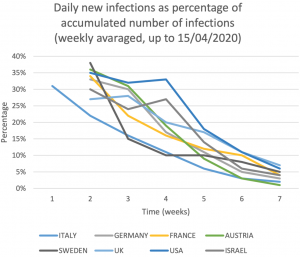Saturday 25 April 2020

I won’t change my locks just yet (Pixabay)
One of the few advantages of a Covid Crisis, if there is any to be had, is that experts pop up in all manner of places. Because the virus is so new, because science knows so little about it, anyone can say anything they wish. To prove them right is difficult, to prove them wrong is equally hard.
It is rather like the politicians who are presently saying, and purely for political gain, “If you had done this, then such-and-such would have happened. It is your fault everything has gone wrong.” Basically, they haven’t a clue and are making it up as best they can, as events unfold before them.
With all these experts appearing, and politicians asking uninformed questions for little other than personal advantage, I was fascinated by a theory that has arisen from Israel. I read in their Times of Israel that a Professor Isaac Ben-Israel has said that the spread of the coronavirus declines to almost zero after 70 days, no matter where it strikes and no matter what measures governments impose to try and thwart it.
Ben-Israel is well known in his world as a physicist, mathematician, retired major-general, and head of two prestigious think tanks at Tel Aviv University, so he is not a dough head. He believes that lockdown is an example of mass hysteria.
The principle is that viral growth, we are told, is exponential. If this happens, then the State of Israel, in this case, would have doubled its infections every few days. According to Ben-Israel, the virus may start out infecting exponentially but then moderates and ultimately fades, eight weeks or so after the outbreak. Some would claim that the decline is because of lockdown, but this same pattern occurs wherever in the world data are available.
Instead of looking at the number of patients or the number of deaths, it is possible to look at the number of new infections as a percentage of the total. Surprisingly, at least to me, this is very similar at similar points in the disease process, regardless of the country being studied.
Ben-Israel states that it is important to distinguish between a lockdown policy, which includes an economic shutdown, and policies of social distancing. The former will include the latter, but the latter does not have to include the former. Lockdown introduces all manner of further problems. For example, in Israel it is estimated that their GDP will decline by 8% for every month of lockdown.
Knowing how useless I am at mathematics, I asked a proper mathematician to give their view. This is what they said:
“There are some troublesome signs in Ben-Israel’s arguments (inconsistent axis labelling, odd representation of what people mean by exponential growth)…He seems to be playing a bit of a game with words. “Exponential growth” means that the number of cases grows by a percentage per day that does not vary greatly. No-one says that the period of such growth has to last forever.
I find his article superficial and naive. I am not convinced that his data supports his conclusion…that is not to say that conclusion is incorrect.
Also, social habits differ greatly around the world – a certain measure taken in Korea may have a different effect than in the USA, say, and vice versa different measures may well be needed in different countries.
So, in summary, there are warning signs in the way the article is written. I do not accept his conclusion is proven.”
So that’s that then. It seems we are all agreed. Ben-Israel may be a mathematical bigwig but has yet to prove his theory. It was, however, good while it lasted.
The media are on a mission to make the government squeal, in their capacity of self-appointed opposition, so the current target is Matt Hancock’s claim that 100,000 tests for Covid-19 could be performed daily by the end of this month. Earlier the Prime Minister had stated that 250,000 daily tests was an end point. Today alone, 25 April, we have managed 29,058 tests. I sense the government has a little way to go. A new website for keyworkers, which allows them to book their own test online ran into trouble shortly after it was opened by the government. It seems that 5000 home testing kits were ordered in the first two minutes of the site going live, the thing could not manage, and had to be closed down.
I had an interesting chance meeting today as I took a brief walk through the streets of London. Bond Street runs precisely north-to-south, so if you time it right, you can have sun in your face the whole way, should you wander from top to bottom. As an added bonus, during London Lockdown the street is largely empty, apart from an increasing number of cyclists who have decided that the one-way direction of Bond Street does not apply to them. I rounded one corner, ended up in Albemarle Street, walked past the Royal Institute, and there was a chap in full racing cycle gear, sitting on a step.
“Good day for it,” I said, introducing myself with a non-specific greeting and indicating the clear blue sky above us. It was shortly after mid-day.
“It is,” came the reply. He was perhaps in his mid-fifties, adding, “But my business has just been burgled.”
I looked surprised but the stranger continued as he pointed over his shoulder, somewhere around a corner and down a narrow alleyway. “All four floors cleaned out,” he said. “I came in to see the damage.”
Our conversation continued for another few minutes and I then walked on, while wishing the stranger well. I had no worries about social distancing as he was as wary as me. I would guess we had held a good 15 metres between us as we spoke. Actually, speaking is an inaccurate description of how mankind communicates these days. I am becoming accustomed to holding conversations by yelling. Social distancing has many advantages, but its disadvantage is that whispering has all but vanished, as has normal conversation. I have seen some people telephone each other from either side of the same street, as it is the only way they can be properly heard.
To see the cyclist looking lonely on an Albemarle Street doorstep, saddened me greatly. Burglar Bill was taking advantage of a time when there was a great deal of national suffering, but I guess that is what bad people do. I sometimes wonder if bad folk ever think they are bad. Do they regard their behaviour as normal? They probably do.

Burglaries have declined during lockdown
The police have said that crime has fallen by 28% overall in Britain since lockdown was introduced. Burglaries were down by 37%, although that is no consolation to the cyclist I met on Albemarle Street. Vehicle crime has declined by 27%, reported rape by 37% and shoplifting by a whopping 54%. That is no surprise with most of the shops shut. Drug dealing on the streets has happily declined dramatically, and knife crime, too. Meanwhile domestic violence has risen by 3%. Personally, I would have thought it would be more.
Cybercrime meanwhile, has exploded, perhaps created by the increased level of homeworking and the lower levels of security associated with that. The latest trend appears to be ransomware, where you are locked out of your system until you pay up. To add to these are phishing attacks, online donation scams, and online shopping scams where the demand for deliveries means that the cybercriminals are becoming truly excited. Cybercrime is where it is at.
Meanwhile, the police appear worried about what will happen after lockdown is removed, as society may be more volatile and agitated. That is already happening around the country. The police do have a point.
However, I won’t change my locks just yet, although I will update my passwords.


